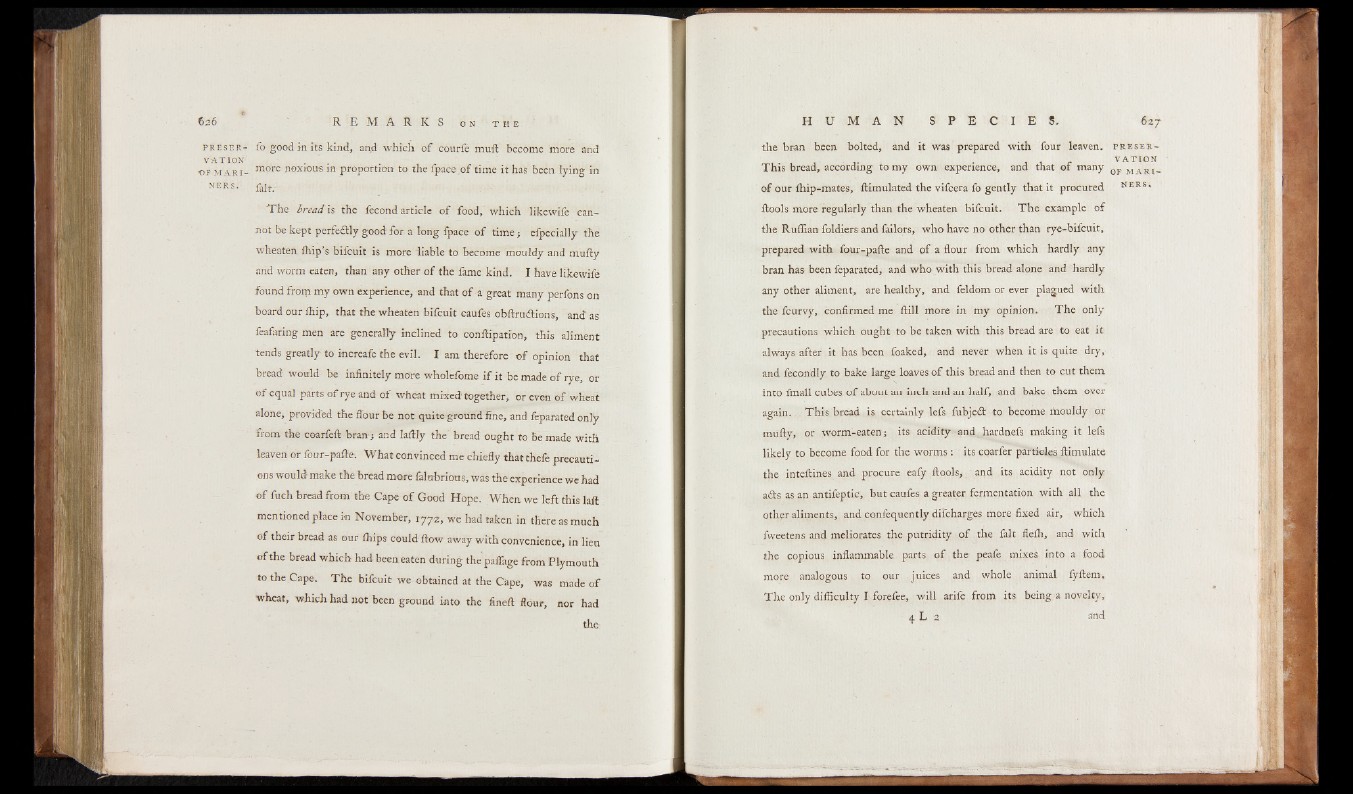
p r e s e r - fo good in its kind, and which o f courfe muft become ‘more and
v a t i o n ’ - .
•oF MARi- more noxious in proportion to the fpace of time it has been lying in
N E R S .
T h e bread h the fecond article o f food, which likewife cannot
be kept perfectly good for a long fpace o f time; efpecially the
wheaten fhip’s bifcuit is more liable to become mouldy and mufly
and worm eaten, than any other o f the fame kind. I have likewife
found from my own experience, and that o f a great many perfohs on
board our ffiip, that the wheaten bifcuit caufes obftrudions, and as
feafaring men are generally inclined to conffipation, this aliment
tends greatly to increafe the evil. I am therefore o f opinion that
bread would be infinitely more wholefome i f it be made o f rye, or
o f equal parts o f rye and o f wheat mixed together, or even o f wheat
alone; provided the flour be not quite ground fine, and ieparated only
from the coarfeft bran; and laftly the bread ought to be made with
leaven or four-pafte. What convinced me chiefly that thefe precautions
would make the bread more falubrious, was theexperience we had
o f fuch bread from the Cape o f Good Hope. When, we left this laft
mentioned place in November, 1772, we had taken in there as much
of their bread as our lhips could flow away with convenience, in lieu
o f the bread which had been eaten during the paflage from Plymouth
to the Cape. T h e bifcuit we obtained at the Cape, was made of
wheat, which had not been ground into the fineft flour, nor had
the
627
the bran been bolted, and it was prepared with four leaven, pr e ser -
v a t io n This bread, according to my own experience, and that o f many 0F m a r i -
o f our fliip-mates, ftimulated the vifcera fo gently that it procured ners.
Itools more regularly than the wheaten bifcuit. T h e example of
the Ruffian foldiers and failors, who have no other than rye-bifcuit,
prepared with four-pafte and o f a flour from which hardly any
bran has been feparated, and who with this bread alone and hardly
any other aliment, are healthy, and feldom or ever plagued with
the fcurvy, confirmed me ftill more in my opinion. Th e only
precautions which ought to be taken with this bread are to eat it
always after it has been foaked, and never when it is quite dry,
and fecondly to bake large loaves o f this bread and then to cut them
into fmall cubes o f about an inch and an half, and bake them over
again. This bread is certainly lefs fubjedt to become mouldy or
mufty, or worm-eaten; its acidity and hardnefs making it lefs
likely to become food for the worms: its coarfer particles ftimulate
the inteftines and procure eafy ftools, and its acidity not only
adts as an antifeptic, but caufes a greater fermentation with all the
other aliments, and confequently difcharges more fixed air, which
fweetens and meliorates the putridity o f the fait flelh, and with
the copious inflammable parts o f the peafe mixes into a food
more analogous to our juices and whole animal fyltem.
The only difficulty I forefee, will arife from its being a novelty,
4 L 2 and
'ij